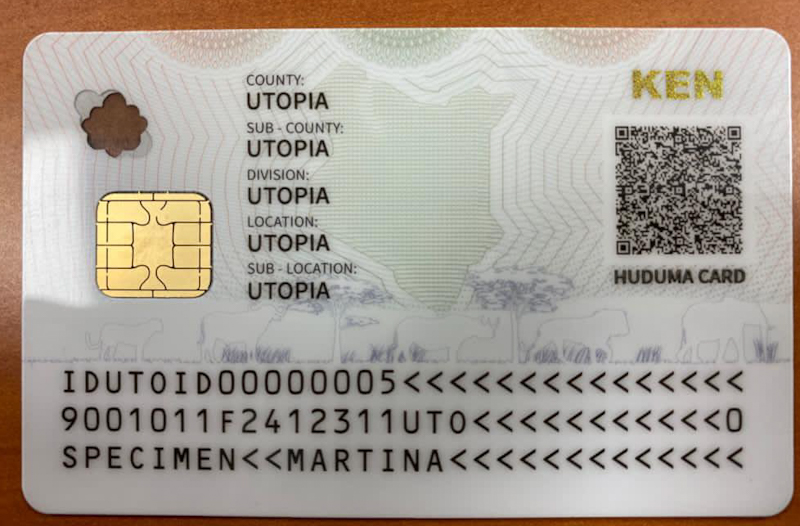Kenya is set to launch a digital identity system that will revolutionize the way citizens access public and private services online.
The government has partnered with the United Nations Development Program (UNDP) to develop and implement the Digital ID, which will be a virtual identity for registered persons.
The Digital ID will be linked to a unique personal number called Maisha Namba, which will be the official name for the unique personal identifier (UPI) that will be assigned to each individual from birth to death.
The Maisha Namba will enable citizens to verify their identity online using biometric features, such as fingerprints or facial recognition. This will make it easier and faster for them to access services such as banking, health care, education, social protection, and e-commerce.
The government and the UNDP signed an agreement on Monday in Nairobi to formalize their collaboration on the project, which is expected to be launched on Oct. 2.
Kenya and @UNDPKenya sign an MoU to support the creation and rollout of the Digital Identity in the country. The ID is set to be launched in early October this year. pic.twitter.com/Nm53ZGLz5L
— Citizen Services KE (@C_ServicesKE) August 14, 2023
The UNDP will provide technical assistance and work with the government to mobilize funding and other resources to support the development and implementation of the Digital ID.
Immigration and Citizen Services principal secretary Julius Bitok said the project was crucial for the country’s digital transformation and that the government was leveraging the partnership and technical advice of UNDP to realize a solid fool-proof digital identity.
He said Kenya hopes to benefit from the UN’s vast experience gained from supporting at least 25 countries across the world to develop their own digital ID systems.
He also said going digital with personal identity was intended to make the country compliant with international standards on cross-border travel set by the International Civil Aviation Organization (ICAO) and other agencies.
UNDP Resident Representative in Kenya Anthony Ngororano described the Digital ID as the missing link between citizens and accessible digital services and said the UNDP was keen to support the government to bridge the gap.
He said the objectives of the ongoing digitalization of government services were aligned with the UN’s Sustainable Development Goals (SDGs) and that the Digital ID would contribute to achieving them.
He also said the Digital ID would enhance social inclusion, economic empowerment, and civic participation of citizens, especially women, youth, and marginalized groups.
Related ID Products
In addition, the government will roll out four related products as part of the presidential directive to create a Digital Identity System.
The first product is Maisha Namba, which will be a Unique Personal Number that will identify each individual from birth to death. The Maisha Namba will be linked to the person’s biometric and demographic data and will serve as the primary identifier for all purposes.
The second product is Maisha Card, which will be the physical document that will contain the Maisha Namba and a QR code. The Maisha Card will replace the current second-generation ID and will be used for offline verification of identity.
The third product is Digital ID, which will be the virtual digital identity for registered persons. The Digital ID will enable online authentication using biometric features, such as fingerprints or facial recognition. The Digital ID will facilitate access to public and private services online, such as banking, health care, education, social protection, and e-commerce.
The fourth product is the National Master Population Register, which will be a single integrated register of data on Kenyans and foreigners resident in the country. The National Master Population Register will consolidate existing and independent databases, such as civil registration, immigration, health, education, and social protection. The National Master Population Register will improve data quality, accuracy, and security.
Past Digital Identity System Initiatives
An ICT Lecturer and Consultant, Mr John Walubengo, says Kenyans know the hassle of having multiple identity cards that they have to show to different actors in the public and private sectors depending on their current needs.
“The digital ID, dubbed Huduma Namba, was supposed to make this burden easier, eliminating the need to carry all other documents.”
“Like all projects, the devil lies in the details,” he noted in reference to the Huduma Namba project which faced multiple court cases.
Civil Society organizations demanded that the government ensure that the data they are consolidating in a centralized manner is safe and secure and conforms to the Data Protection Act.
According to the Kenya ICT Action Network (KICTANet) policy brief on “Data protection and digital identity in Kenya”, personal data, which is protected by the Data Protection Act, is intricately linked to a person’s identity.
“The right to privacy assures an individual’s dignity by allowing them to reserve certain aspects of their lives from public glare and commercial exploitation. Self-ownership, which includes control over personal data, is a component of a person’s identity. Legal identity is a small but important part of self-identity.”




